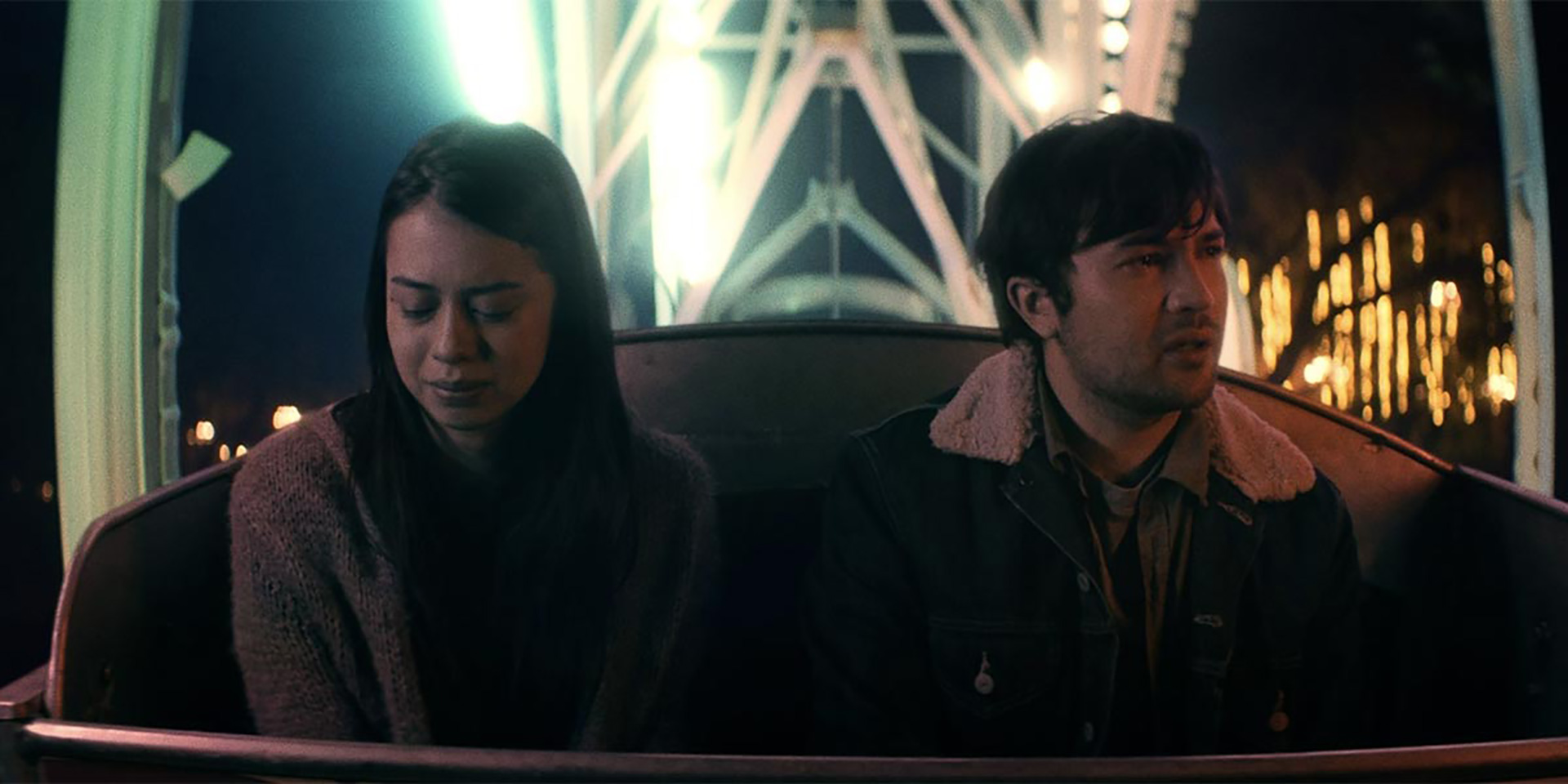Despite only being 24 years old, Walker (Taylor Gray) and Albee (Amber Midthunder) head into the woods from their Los Angeles existence to try to save their eight-year marriage (for more context, they’re from Texas). Well, he’s trying to save their marriage. To look at their interactions is to wonder why Albee hadn’t left years ago. We catch glimpses of a smile every now and then, but mostly her head is buried in her phone or coldly lamenting why Walker has taken her to the middle of nowhere to read a self-help book that she doesn’t believe can fix what’s broken. And maybe his desire to try is less about optimism than it is delusion. Maybe their union isn’t what’s broken; it’s them. To fix that means confronting even worse pain.
Director Steve Pink and screenwriter Trent Atkinson know the willingness to actually confront it is virtually non-existent in situations like this. They know Albee’s anger and self-sabotage (stemming from an abusive foster home) will always prevent her from meeting Walker halfway, and that his acceptance of that fact will ultimately lead her to finally agree just when it’s too late. These characters are on exact opposite trajectories wherein their overlap is but the split-second as they pass each other by. It becomes a double-helix of sorts—one desperately seeking to repair just when the other stops seeing the point. On and on it goes until one of them breaks free and leaves or stops. Their pain either brings them closer or tears them apart.
Does that constitute a cycle? I guess the repetition would. Even so, The Wheel of the title is more about a destination—namely the Ferris wheel set-up just outside the camp site run by Carly (Bethany Anne Lind) and Ben (Nelson Lee) that Walker hopes to ride when he and Albee patch things up. It also becomes a sort of isolation chamber where the two might just be able to finally be honest without the threat of embarrassment that comes from airing grievances in public. Because being alone isn’t necessarily in the cards once Carly notices the trouble they’re having. She’d like to help them fix things so they can find the happiness she and Ben share. Except—not surprisingly—that happiness isn’t quite so perfect either.
The resulting storytelling is hardly unique. Depressed couple meets happy couple and that which they see in each other finds a way to bring out truths they’ve been actively avoiding for too long. Atkinson writes things so heavy-handed that you wonder how both Walker and Albee could ever reconcile, how Carly and Ben could ever dissolve, but we intellectually know that’s where things must head. That doesn’t mean the former couple will find their love and the latter will lose theirs—just that the possibility of those conclusions must be floated for there to be any reason for us to care about the quartet. We need the potential for change even if it doesn’t arise; that potential will invariably help them at least recognize their own instability.
These mirrored looks are where The Wheel shines. What’s Walker doing, despite the futility of his situation, that Ben isn’t? How much of Albee’s abrasiveness is an act, how much is it her acknowledging the harsh reality of her relationship’s imperfections—the one thing Carly seems dead-set on ignoring so that she and her fiancé can have their wedding day? There’s truth to what Albee says when Ben’s “honesty” towards Carly is about something so insignificant in comparison to the horrors she and Walker endured. It’s not that he’s lying, though. The two of them simply haven’t experienced anything “real” in the sense of needing to harbor strong emotions beyond the bliss of quiet living and sexual attraction. Are they happy or merely content?
That Walker and Albee are so volatile means there’s something worth salvaging. That fire means they care, despite one being too afraid to admit it and the other too afraid to not. Having to continuously revisit that well during an already brief runtime (The Wheel runs about 80 minutes) can feel redundant, but it matters once their climactic moment on the Ferris wheel lets them get everything off their chests. That this fact in and of itself also renders Carly and Ben’s troubles secondary (and almost forgettable) is a shame. Pink and Atkinson seemed to be consciously working to make us care about them just as much as the main pair only to drop them when their part in the latter’s lives runs its course.
I wonder, then, if this story would have been better suited as a two-hander. Give me something like Blue Jay where we just sit with Walker and Albee as they come to grips with the foundation their love sits upon and whether it’s worth saving. I think Midthunder and Gray have the goods to deliver that more intimate exchange, too—the final long-take blow-out is all the evidence we need. Everything Carly and Ben bring in (Lind and Lee are effective) could have arrived internally to render their presence obsolete at the start, just as the filmmakers do by the end. I do still think there’s enough here to warrant a look. It’s messy and overly convoluted, but the ends do mostly justify the means.
The Wheel premiered at the Toronto International Film Festival.

